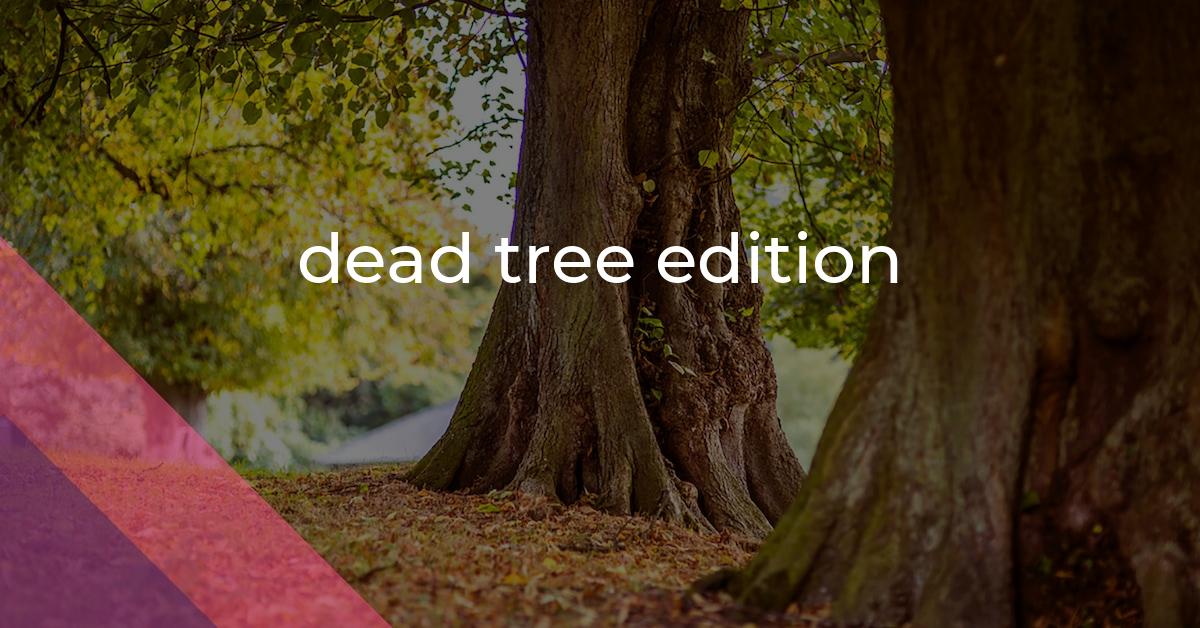dead tree edition: Idiom Meaning and Origin
What does ‘dead tree edition’ mean?
The idiom "dead tree edition" refers to a printed version of a publication, typically a newspaper or a book, as opposed to its digital or online format.

Idiom Explorer
The idiom "stop press" refers to a situation where the printing of a newspaper or magazine is momentarily halted to include late-breaking news or updates.
The idiom "dying breed" refers to a group or type of people or things that are becoming rare or disappearing completely. It implies that there are few remaining members or examples of that particular group or type.
The idiom "dope sheet" refers to a document or information sheet that provides detailed and essential information about a particular subject or event.
The idiom "die out" means to cease to exist or become extinct. It is often used to describe the decline or disappearance of a species, a language, or a cultural tradition.
The idiom "die down" means to gradually become less intense, loud, or active.
The idiom "to die" means to cease living, to expire, or to perish. It is often used figuratively to express a strong feeling or desire, such as "to die laughing" or "to die for." This idiom is commonly used in English literature and everyday conversations.
The idiom "dead to rights" means catching someone red-handed or in undeniable guilt, leaving no room for doubt or escape.
The idiom "dead soldier" is used to refer to an empty or finished bottle of alcohol, symbolizing the end of its use. It is often used informally and colloquially to describe the state of a bottle after all its contents have been consumed.
The idiom "dead on" means to be exactly right or accurate about something. It is often used to describe a person's guess or prediction that turns out to be correct.
Origins Unveiled
The idiom "dead tree edition" is commonly used to describe print newspapers. It refers to the physical, paper format of a newspaper, as opposed to an online or digital version. The idiom draws upon the imagery of a tree being cut down to produce paper, highlighting the contrast between traditional print media and the digital nature of online news.
In this idiom, the term "dead tree" symbolizes the paper used in printed newspapers. The word "edition" refers to a specific version or issue of a newspaper. Together, these words convey the idea that the printed newspaper is no longer alive or sustainable, serving as a metaphorical representation of the decline of print media.
This idiom reflects the ongoing shift from print to digital media, a trend that has become increasingly prevalent in recent years. With the rise of online platforms for accessing news, print newspapers have faced numerous challenges. The phrase "dead tree edition" captures this transformation and highlights the societal shift towards digital media consumption.
One related idiom that can be connected to "dead tree edition" is "dead wood." This phrase is often used to describe something or someone that is no longer useful or productive. It signifies the presence of unnecessary or outdated elements within a specific context. In the case of print newspapers, the idiom "dead tree edition" can be seen as a reflection of the perception that print newspapers are becoming obsolete in the digital age, akin to "dead wood" that no longer serves a purpose.
Another related idiom is "dead and buried." This phrase is used to describe something that is definitively finished or over. In the context of print newspapers, the idiom "dead tree edition" can be seen as an acknowledgment that traditional print media is on the decline, or even "dead and buried." The rise of digital technology has ushered in a new era of news consumption, and the idiom captures the finality of this transition.
A third related idiom is "stop press." This phrase originates from the time when newspapers were printed using movable type. It refers to the practice of halting the printing process to insert late-breaking news stories. In the context of the idiom "dead tree edition," the phrase "stop press" can be seen as a contrast to the static nature of print newspapers. While a "dead tree edition" implies a fixed version of a newspaper, "stop press" emphasizes the dynamic, ever-changing nature of news.
Overall, the idiom "dead tree edition" encapsulates the transformation of print media in the digital age. It speaks to the decline of traditional newspapers, the rise of digital platforms for news consumption, and the accompanying nostalgia and environmental considerations associated with print media. The related idioms "dead wood," "dead and buried," and "stop press" further contribute to the understanding of the evolving media landscape and the complex relationships between technology, language, and cultural change.
Example usage
Examples of the idiom dead tree edition used in a sentence:
- I prefer reading the dead tree edition of newspapers over their digital counterparts.
- Some people argue that the dead tree edition of books will eventually become obsolete.
- Even in the digital age, many people still enjoy flipping through the pages of a dead tree edition magazine.
More "Media" idioms



